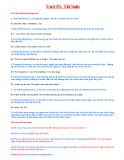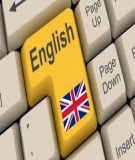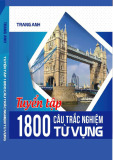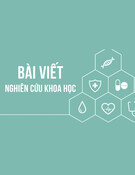
Exercise 2: Instructions as above.
52
1. God Save the Queen is:
(a) The name of the UK's national anthem. (b) The motto of the UK.
2. A green belt is:
(a) An academic qualification awarded to people who complete a degree course when they are fifty or older.
(b) An area of countryside surrounding a large town or city, and which cannot be built on.
3. A guide dog is:
(a) The informal name given to a government adviser who helps member of the Cabinet make a decision. (b) A
specially trained dog that helps blind people to become more independent.
4. The gutter press is:
(a) A derogatory nickname given to some of the popular newspapers that report gossip and scandal rather than
news. (b) An informal name given to the national obsession for following strange diets in order to lose weight.
5. The Home Counties are:
(a) The counties where the Queen has one of her official residences. (b) The counties that surround London.
6. A jumble sale is:
(a) A transaction in which the government sells off national industries to other countries. (b) An event where
people raise money by selling old things that they don't want any more.
7. A kilt is:
(a) An item of clothing traditionally worn by Scots. (b) A loud party involving lots of singing and dancing,
usually as part of a national celebration.
8. A lollipop lady or man is:
(a) A woman or man who looks after people's children when they are at work. (b) A woman or man whose job
is to help children cross the road safely (usually when they are going to or from school).
9. A milkman is:
(a) An informal word for a man who is not married (and usually still lives at home with his parents).
b) Someone whose job it is to deliver milk to people's houses on a regular basis.
10. Ms is / are:
(a) The letters that are written after the name of someone who has obtained a Master of Sciences degree. (b) A
formal title that is used in front of a woman's surname when speaking to, or writing to, her when we don't
know whether or not she is married.
11. Nessie is:
(a) A popular nickname for Elizabeth, the Queen of the UK. (b) A popular nickname for the Loch Ness Monster,
a legendary monster that lives in a lake in Scotland.
12. An offie is:
(a) An informal word for a day off from work taken by someone who is pretending that he / she is ill. (b) An
informal word for an off licence (a shop that sells alcohol to take away).
13. The Old Bailey is:
(a) A common name for the Central Criminal Court in London. (b) The name of the UK's longest-running
newspaper.
14. The Old Bill (or sometimes just the Bill) is:
(a) A nickname for the police. (b) A nickname for the Bank of England.
15. Oxbridge is:
(a) An informal word for anyone who has been to (and graduated from) university or another form of higher
education. (b) The collective name for the two famous universities of Oxford and Cambridge.

Exercise 3: Instructions as above.
53
1. Oxfam is:
(a) A government-backed organisation that helps British farmers get more money for their products.
(b) A charity organisation that raises money for poor people in other countries.
2. Planning permission is:
(a) The official permission a couple need if they want to have more than two children. (b) The
permission that is needed from a local authority before carrying out certain kinds of building work.
3. A quid is:
(a) A very informal word for a pound (£). (b) An informal word for a child.
4. Recess is:
(a) The long period during the summer when Parliament stops meeting. (b) The period between one political
party losing a general election, and a new political party taking over.
5. Scotch is:
(a) Scottish whisky. (b) A Scottish person.
6. A senior citizen is:
(a) Someone who is more than 60 years old. (b) Any member of the Royal Family.
7. Speaker's Corner is:
(a) The name of a popular political television programme. (b) A place in London where ordinary people can
speak freely and publicly on any subject they like.
8. Stilton is:
(a) The period of the year between January 1st and Easter. (b) A strong-smelling cheese that is often eaten at
Christmas.
9. A tenner is:
(a) An informal word for a ten pound (£10) note. (b) An informal word for a man or woman who is good at
everything he / she does.
10. A Tory is:
(a) A slightly derogatory name for a member of the Conservative Party, or one if its supporters. (b) A town or
village that has no political representation in an election.
11. Ulster is:
(a) Another name for the Republic of Ireland, used especially by Irish nationalists. (b) Another name
for Northern Ireland, used especially by Irish unionists.
12. V.A.T. is:
(a) A tax on goods and services (Value Added Tax). (b) A famous sporting trophy for which universities compete
(The Varsity Association Trophy)
13. A vicar is:
(a) A public protest against government action. (b) A priest in the Church of England.
14. Wellies are:
(a) People who cannot decide who to vote for in an election (from the word "Well…"). (b) Rubber boots
(properly called Wellingtons) which do not let water in.
15. A whip is:
(a) Someone in a political party whose job is to make certain that other members go where they are needed
and vote in the correct way. (b) A member of a political party who rebels against that party or one of its
policies.

Choose the best word or phrase to complete sentences 1 – 18. In some cases, more than
one answer may be possible, and in some cases the answer depends on certain situations.
54
Utilities and services
1. Water that is piped into your home is safe / unsafe to drink.
2. Water bills must be paid once a year / twice a year / in ten instalments throughout the year.
3. The amount you pay for your water depends on the size of your property / the amount of
water you use.
4. If you receive housing benefit from your local social security office, the cost of water bills is
included in it / it does not cover the cost of water bills.
5. Electricity is supplied to UK households at 240 / 300 volts.
6. All / most UK homes are supplied with gas.
7. Electricity and gas are all supplied by the same company / different companies.
8. Transco is the name of the organisation that supplies gas / electricity across the network to
providers.
9. Most land-line telephone services in the UK are provided by Vodafone / British Telecom.
10. In an emergency (for example, if you need the police, an ambulance or the fire brigade), the
telephone number to call is 112 / 999.
11. Refuse (household rubbish) is collected from outside people's homes once / twice a week.
12. It is possible / not possible to leave items such as glass and paper outside your house to be
collected for recycling.
13. You can / cannot leave large items such as refrigerators, televisions, etc, for refuse collection.
14. Everybody in the UK must pay a property tax which is used to pay for local government services. This
is called a council / poll tax.
15. This tax must be paid once a year / twice a year / in ten instalments throughout the year.
16. If you buy a property using a mortgage, the mortgage provider will insist that you have a full-time
job / a partner (eg, a husband or wife) / household insurance.
17. If someone lives in a council-owned property and creates excessive problems for his / her
neighbours, he / she can be taken to court and fined / evicted from his or her property.
18. If you live in a private property and are having problems with your neighbours, the best thing to do
in the first instance is try to talk to your neighbour about it / call the police.

Exercise 1: Look at these conversations, and complete each one with words or expressions
from the box. Then decide where the speakers are in each case.
Where are they?
55
bar cashback change checked in circle fare half housekeeping luggage
matinee meter mini bar packing peak performance PIN pints platform
reception return room service round snacks stage yourself
1.
Speaker 1: Here we are, mate. Town centre. That's £9.20 please.
Speaker 2: £9.20? But your (a)________ says £8.20.
Speaker 1: I know, but we charge £1 for each item of (b)________ carried.
Speaker 2: Oh, right. Well, here's £10. Keep the (c)________.
Speaker 1: Thanks mate.
2.
Speaker 1: I'd like a cheap day (a)________ to Oakford, please.
Speaker 2: It's still the (b)________ period, so I'll have to charge you full (c)________. Is that OK?
Speaker 1: I suppose so. How much will that be?
Speaker 2: £38.75. The next service goes from (d)________ 18 in five minutes.
3.
Speaker 1: Hello. Is that (a)________?
Speaker 2: Yes, sir.
Speaker 1: Good. I've just (b)________, and there don't seem to be any towels in my bathroom.
Speaker 2: Ah, you want (c)________. Call the (d)________ and they'll put you through.
Speaker 1: Thanks. Oh, while you're there, could I have some more water for the (e)________ please?
4.
Speaker 1: I'd like two tickets for this evening's (a)________, please.
Speaker 2: I'm afraid we're sold out for tonight. The only tickets we have left are for tomorrow's
(b)________.
Speaker 1: Oh, I see. In that case, I'll have two for tomorrow afternoon's show.
Speaker 2: Fine. Seats in the stalls are £22, and in the (c)________ they're £18. All seats have a good
view of the (d)________.
5.
Speaker 1: Good morning. Would you like any help (a)________ your bags?
Speaker 2: Hello. No, I'll manage, thanks.
Speaker 1: (A few minutes later) That's £56.50 please.
Speaker 2: Thanks. I'll pay for that with Maestro.
Speaker 1: Thank you. Would you like any (b)________?
Speaker 2: Not today, thanks.
Speaker 1: OK. Could you enter your (c)________ and press 'Enter', please?
6.
Speaker 1: The usual?
Speaker 2: No, it's my (a)________. Two (b)________ of lager, please. And do you do food?
Speaker 3: At lunchtime we just do (c)________. The menus are on the table. Order at the (d)________
and we'll bring your food to the table.
Speaker 2: OK. Well, I'll pay for these now.
Speaker 3: Right you are. That's £5 please.
Speaker 2: Thanks. Oh, and one for (e)________?
Speaker 3: That's very kind of you. I will, thanks. Just a (f)________.

Exercise 2: Instructions as above.
56
account allergy balance bill branded change deposit dessert
GP hay fever pass pharmacist prescription pump receipt
remedies registered reservation seat service shout statement
surgery transactions unleaded withdrawal
1.
Speaker 1: Good afternoon. I'd like to order a repeat (a)________, please.
Speaker 2: Right, what's it for?
Speaker 1: It's for a salbutamol inhaler for my asthma.
Speaker 2: All right. Are you (b)________ with this (c)________?
Speaker 1: No, not yet. I've just moved to the area.
Speaker 2: Right, well, you need to fill in this form and then make an appointment to see one of our
(d)________'s.
2.
Speaker 1: Hello, are you the (a)________?
Speaker 2: I am. How can I help you?
Speaker 1: Well, I've got bad (b)________. I was wondering if there are any over-the-counter
(c)________ that might help.
Speaker 2: There are several, but we have our own-brand anti-(d)________ tablets, which might help.
They're cheaper than any of the (e)_______ products available, but they're just as good.
3.
Speaker 1: Good evening, madam. Do you have a (a)________?
Speaker 2: Yes, four for eight-thirty. The name's Ross. Helena Ross.
Speaker 1: (2 hours later) Was everything all right?
Speaker 2: Yes, it was very nice, thank you, but the (b)________ was a bit slow.
Speaker 1: I'm sorry about that, madam. We're a little short-staffed tonight. Would you like some
(c)________?
Speaker 2: No thanks. We're running a bit late. Could we just have the (d)________ please?
4.
Speaker 1: Good afternoon. I'd like to (a)________ this cheque please. And could I check the
(b)________ of my (c)________?
Speaker 2: Certainly. It currently stands at £350.
Speaker 1: That's a bit less than I thought. Could you print me out a (d)________ showing my
(e)________ over the last two weeks?
Speaker 2: No problem. (A few moments later) Here you are, Mr Walton.
Speaker 1: Thanks. Mm, I don't recognise this (f)________ here. Can you find out where it was made?
5.
Speaker 1: Do you go to North Parade?
Speaker 2: I do. That's £1.60 please. Have you got the right (a)________? I'm a bit short.
Speaker 1: Actually I've got a (b)________. Could you tell me when we get there?
Speaker 2: Yes. Take a (c)________ and I'll give you a (d)________.
6.
Speaker 1: Which (a)________?
Speaker 2: Er, number 7.
Speaker 1: Number 7. 22 litres of (b)________?
Speaker 2: That's right.
Speaker 1: That's £20 exactly. Would you like a (c)________?




![English 4 [Mô tả/Định tính]](https://cdn.tailieu.vn/images/document/thumbnail/2016/20160625/quyduydang1503/135x160/2981466852145.jpg)


![15 hành động thường ngày [Mới nhất]](https://cdn.tailieu.vn/images/document/thumbnail/2015/20150929/tnbc_tr/135x160/2063218559.jpg)






![Từ vựng tiếng Anh về thức ăn và giảm cân [mới nhất, đầy đủ]](https://cdn.tailieu.vn/images/document/thumbnail/2025/20251217/nglinh.diamond@gmail.com/135x160/53091766028543.jpg)


![Tài liệu Từ vựng tiếng Anh Trung cấp [mới nhất]](https://cdn.tailieu.vn/images/document/thumbnail/2025/20250913/nguyentuan250421@gmail.com/135x160/99491757910839.jpg)
![Tài liệu Từ vựng Tiếng Anh theo chủ đề [mới nhất]](https://cdn.tailieu.vn/images/document/thumbnail/2025/20250913/namdhuet@gmail.com/135x160/83251757753810.jpg)



![Tài liệu Từ vựng tiếng Anh cho bé [chuẩn nhất/mới nhất]](https://cdn.tailieu.vn/images/document/thumbnail/2025/20250731/huadaithesang2509@gmail.com/135x160/18631754013896.jpg)



